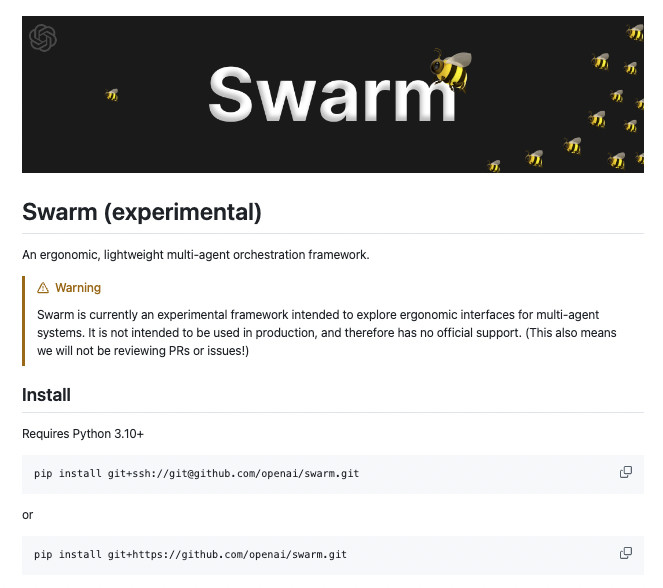In the rapidly evolving world of artificial intelligence, one pressing challenge that developers face is orchestrating complex multi-agent systems. These systems, involving multiple AI agents working collaboratively, often present significant difficulties in coordination, control, and scalability. Current solutions tend to be heavy, requiring extensive resource allocation, which complicates deployment and testing.
OpenAI introduces the Swarm Framework as a solution to simplify the complexities inherent in multi-agent orchestration. Swarm is an experimental framework that focuses on making agent coordination, execution, and testing both lightweight and highly controllable. The goal is to empower developers to manage interactions between multiple AI agents in a straightforward and efficient manner. This framework has been a work in progress for months, and OpenAI is now excited to share it publicly, hoping that it will be embraced by the AI community as a practical tool for building advanced AI systems.
Swarm’s strength lies in its two primitive abstractions: agents and handoffs. An agent in Swarm is a combination of specific instructions and tools that it can use to accomplish a task. At any point during its process, an agent has the ability to “hand off†a conversation or task to another agent, which makes the orchestration seamless and modular. This abstraction not only enables complex interactions among different agents but also ensures that the overall coordination remains under tight control. By leveraging these elements, Swarm is able to keep the coordination and execution processes lightweight, making it a highly testable framework. Additionally, Swarm is built on top of ChatCompletions, which provides a robust and versatile foundation, enabling developers to create and deploy multi-agent systems without unnecessary overhead.
The Swarm Framework is important for several reasons. Firstly, it provides a streamlined way to manage agent communication and transfer responsibilities dynamically between agents. This is crucial in scenarios where different AI agents are specialized in different tasks, requiring an organized and efficient handoff mechanism. Swarm’s lightweight approach means that developers can easily iterate on, test, and refine multi-agent configurations without becoming bogged down by complex infrastructure requirements. Moreover, the highly controllable nature of Swarm means that it is an ideal choice for researchers and developers who want to ensure reliability and efficiency in AI agent orchestration. By keeping things simple, controllable, and efficient, Swarm represents an important step towards making advanced AI systems more accessible to a broader community of developers.
In conclusion, OpenAI’s Swarm Framework aims to overcome significant challenges in the orchestration of multi-agent systems by focusing on simplicity and controllability. By providing a lightweight infrastructure based on agent interactions and task handoffs, Swarm makes multi-agent orchestration not only possible but practical for a wide range of use cases. As multi-agent systems continue to play a crucial role in AI research and applications, tools like Swarm are set to lower barriers, increase accessibility, and ultimately enable the development of more robust and versatile AI solutions. Whether for research, product development, or educational purposes, Swarm offers an exciting opportunity to explore the possibilities of coordinated, multi-agent AI in an efficient and streamlined manner.
Installation
pip install git+ssh://git@github.com/openai/swarm.git
or
pip install git+https://github.com/openai/swarm.git
Usage
from swarm import Swarm, Agent
client = Swarm()
def transfer_to_agent_b():
return agent_b
agent_a = Agent(
name=”Agent A”,
instructions=”You are a helpful agent.”,
functions=[transfer_to_agent_b],
)
agent_b = Agent(
name=”Agent B”,
instructions=”Only speak in Haikus.”,
)
response = client.run(
agent=agent_a,
messages=[{“role”: “user”, “content”: “I want to talk to agent B.”}],
)
print(response.messages[-1][“content”])
Hope glimmers brightly,
New paths converge gracefully,
What can I assist?
Check out the GitHub. All credit for this research goes to the researchers of this project. Also, don’t forget to follow us on Twitter and join our Telegram Channel and LinkedIn Group. If you like our work, you will love our newsletter.. Don’t Forget to join our 50k+ ML SubReddit
[Upcoming Event- Oct 17 202] RetrieveX – The GenAI Data Retrieval Conference (Promoted)
The post OpenAI Releases Swarm: An Experimental AI Framework for Building, Orchestrating, and Deploying Multi-Agent Systems appeared first on MarkTechPost.
Source: Read MoreÂ

![Why developers needn’t fear CSS – with the King of CSS himself Kevin Powell [Podcast #154]](https://devstacktips.com/wp-content/uploads/2024/12/15498ad9-15f9-4dc3-98cc-8d7f07cec348-fXprvk-450x253.png)